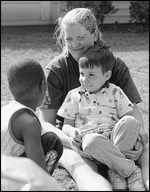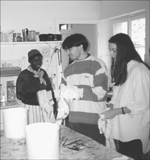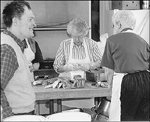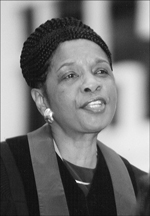
|
|
Students and Teachers Organize a Live-In Ministry. Student Rachel Winter confers with neighbors.
|
It is a truism that theological schools belong to multiple communities— denominations, supporting congregations, the academy. Sometimes the surrounding physical communities are overlooked as schools become islands sufficient unto themselves, cut off from the neighborhoods in which they happen to exist. Some schools, though, are working on being good neighbors. Here are the stories of five such schools.
Students and Teachers Organize a ‘Live-In' Ministry
A neighborhood ministry that benefits the caregivers as much as the caregetters is, in part, the result of a creative solution to the problem of alternative housing that faced Columbia Theological Seminary a couple of years ago. Project BUTLER (Building Unity Through Love and Energizing Recreation) began as an after-school program in the Villages of East Lake apartments. Each Tuesday afternoon, adult volunteers and approximately twenty-five children gather to eat, learn, worship, and play together in a safe environment.
“The children want to be loved, and we’re there to do it,” says student Robert Alexander. The program emphasizes building relationships, mutual respect, and leadership.
Once a beleaguered inner-city housing project, East Lake’s redevelopment was funded by Tom Cousins, an Atlanta developer, and his wife Ann, a member of Columbia’s Board of Trustees. Students and a new faculty member—Rodger Nishioka, associate professor of Christian education—moved in to some of the apartments while a campus residence was being renovated, gaining both a place to live and opportunities for ministry. The community-based ministries were so successful and rewarding that last year East Lake students encouraged Columbia’s board to continue the program even after the campus housing reopened. The response was overwhelmingly positive.
East Lakes has been transformed into a mixed-income community that focuses on spiritual and economic growth, and the BUTLER experience has helped shape the lives of Columbia students like Rachel Winter, who has come to understand that God is calling her into urban ministry. “It’s a practical way of doing ministry—by providing a needed presence,” she says.
“The grace of God opened many doors and windows to this ministry,” says Phil Gehman, dean of students. “The seminary is deeply grateful to the members of the seminary community for trying something unknown and doing such a good job.”

|
| Hammering Out a Positive Civic Presence
George Fox president David Brandt prepares to scrape.
|
Hammering Out a Positive Civic Presence
There were no classes at George Fox University or George Fox Evangelical Seminary on September 8. Instead, the schools’ faculty, students, and staff—some 1,500 of them—fanned out across the county in work groups of twenty or so. They built skateboard parks, did maintenance on churches, and picked up trash from the highways alongside prison workgroups. They cleaned buses for a retirement community. They worked with Habitat for Humanity. University president David Brandt helped prepare the house of Roy Heibert, “campus grandpa,” for painting. What’s a campus grandpa? “He’s a retired member of the physical plant staff,” explained Brandt, “whose job in retirement is to befriend students. He places himself in the middle of chapel, he eats lunch on campus, and his house is open to students.” The school was surprised by the publicity they got from the first-time event. Will they do it again? “We have no choice,” said Brandt. “The next day we had calls from agencies saying, ‘Put us on your list for next year.’”

|
| Western Serves Dinner with a Difference. Soup kitchen cooks come from area churches.
|
Western Serves Dinner with a Difference
Every morning after chapel, students, faculty, and staff of Western Theological Seminary in Holland, Michigan, gather in the school’s commons area to drink coffee and catch up on community news. As they drift off to classes, some stay behind setting tables for the lunch that will serve 85 to 125 clients of the Community Action House soup kitchen. The Reformed Church in America school, which is located within an easy walk of downtown, has given space, utilities, and moral support to the community-based volunteer group for the last eight years. The kitchen is staffed by rotating groups of volunteers like Dennis Stegenga, Marie Van Erden, and Betty De Fouw, mostly from area churches. Some volunteers—like Ruth Hill, who adds warmth by making sure there is always some seasonal decoration—come every day. Western faculty and students often sit and share lunch with the soup kitchen clients. Harold Ritsma of the school’s public relations office notes, “You’ll see the same person every day for months—and then you don’t ever see them again. Or you’ll always see the same person on one day of the week.” Western student Jill van der Veen might know about their whereabouts—she is serving an internship with Community Action House, an outgrowth of the relationship between school and social service group begun with shared space.

|
| Fit to Share? Exercising Faith in Action
Compatible goals and cooperative attitudes laid the foundation for a facility that serves both seminarians and neighborhood youngsters.
|
Fit to Share—Exercising Faith in Action
Most children in Gettysburg, Pennsylvania had no place to swim in the 1970s. Few families could afford the country club, and attempts to build a public pool had failed—victim, some suspected, of the racism of influential civic leaders. In the meantime, the Lutheran Theological Seminary at Gettysburg had unused land and a student body with no access to a fitness facility, while the local Young Women’s Christian Association had program dreams but only a minuscule facility.
The two institutions struck a deal, and the Y built a facility on the seminary’s campus at the edge of town. The Y leases the land for $1 per year. Centerpiece of the facility is a pool. It isn’t a public facility in the strict sense—the Y is a membership organization—but a sponsorship committee pays for memberships for 150 community residents who otherwise couldn’t afford them. (Gretchen Stuempfle, wife of Herman Stuempfle, who was president of the seminary at the time of construction, is still active on that committee.)
Cooperation between the institutions has grown over the years. The Y has a child care facility that is open to the community, but reserves slots for seminarians’ children and is geared to the school’s calendar. Seminarians use the Y for free, and the privilege has been extended to the use of a second building the Y erected up the road from the campus three years ago.

|
| HELP Builds Partnerships to Save Lives. ITC’s Monifa Jumanne takes the message of AIDS prevention to local congregations.
|
HELP Builds Partnerships to Save Lives
Monifa Jumanne is the dean of students at Atlanta’s Interdenominational Theological Center. She is also the administrator of a four-year, $1.2 million grant from the Centers for Disease Control and Prevention aimed at making churches partners in educating about AIDS prevention. Sometimes Jumanne’s job takes her to local congregations, where she talks about the need to educate various groups. “It’s amazing,” she said, “that some people haven’t figured out that you need to reach out to senior citizens differently from young people differently from church members who happen to be gay.”
Sometimes her job involves bringing together groups: in March, representatives of the historically black seminaries (Hood, Howard, the Interdenominational Theological Center, Payne, Shaw, and Virginia Union) met in Atlanta with representatives of Morehouse School of Medicine, the Red Cross, and several church-based anti-AIDS groups. They met under the aegis of the Health Education and Leadership Project (HELP) to work toward a faith-based HIV/AIDS and substance abuse prevention curriculum. “That was exhilarating,” said Jumanne. “Seminaries are the starting point to reach congregations.”